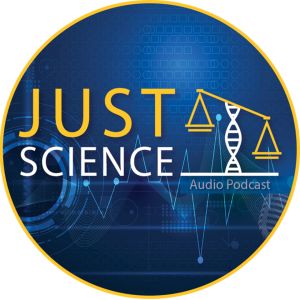The Forensic Science Education Programs Accreditation Commission (FEPAC) was established by the American Academy of Forensic Sciences (AAFS) in 2004 to maintain and enhance the quality of forensic science education. FEPAC-accreditation is one way for students and hiring managers to recognize and distinguish high-quality undergraduate and graduate forensic science programs. In addition to FEPAC, university faculty and forensic practitioners also emphasize the importance of support from the National Institute of Justice (NIJ) for student research projects as they prepare for a career in forensic science. During this season of Just Science, we sat down with distinguished university faculty, FEPAC Commissioners, and forensic practitioners to shed light on the benefits of accreditation, student research, and NIJ involvement in collegiate programs. Our guests provide insight on their FEPAC-accredited programs across forensic disciplines and share advice for current students, professors, and forensic professionals.
The Just Science podcast was hosted by the NIJ Forensic Technology Center of Excellence.
Just the Forensic Laboratory Workforce, Part 2
In part two of the final episode of our Strengthening the Forensic Workforce Season, Just Science continued the conversation with Dr. Peter Stout, Dr. Ray Wickenheiser and Matthew Gamette discussing the future of the forensic workforce. FEPAC accredited institutions provide high quality forensic science education for undergraduate and graduate students. However, coursework does not adequately emulate what working in a forensic laboratory and pursuing a career in forensic science will entail.
Just the Forensic Laboratory Workforce, Part 1
In Episode eight of our Strengthening the Forensic Workforce Season, just sat down with Dr. Peter Stout, president of the Houston Forensic Science Center, Dr. Ray Wickenheiser, Director of the New York State Police Crime Laboratory System and Matthew Gamette, Director of the Idaho State Police Forensic Services Laboratory System, to discuss their perspectives on forensic science training and recommendations for students and faculty and FEPAC accredited programs. FEPAC accredited institutions are preparing students for future jobs in crime laboratories across the United States.
Just Forensic Toxicology and Professional Partnerships
In Episode seven of our Strengthening the Forensic Workforce Season, Just Science sat down with Dr. Karen Scott, an Associate Professor at Arcadia University, and Dr. Jarrad Wagner, a Professor at Oklahoma State University, to discuss research collaborations, keeping on top of the dynamic drug landscape encountered in forensic toxicology case work. One of the requirements of FEPAC accreditation is that programs maintain partnerships with external collaborators such as forensic science laboratories and professional organizations.
Just Trace Evidence from Classroom to Courtroom
In Episode six of our Strengthening the Forensic Workforce Season, Just Science sat down with Dr. Brooke Kammrath, a Professor of Forensic Science at the University of New Haven, and Dr. Tatiana Trejos, an Assistant Professor in the Department of Forensic and Investigative Science at West Virginia University to discuss career paths for individuals trained in trace evidence analytical methods. Trace evidence analysts are tasked with extracting information from small quantity samples like glass, paint fibers and gunshot residue to shed light on what possibly occurred at a crime scene.
Just the Analysis of Impressions and Patterns
. In episode four of our Strengthening the Forensic Workforce Season, Just Science sat down with Assistant Professor Jessica Zarate and fifth year student Kristen Szabelski at Madonna University in Michigan, as well as Dr. Christine Picard, an Associate Professor and Director of the Forensic and Investigative Sciences Program at Indiana University, Purdue University, Indianapolis to discuss their hands on impression and pattern education programs. People will immediately think of fingerprints or bloodstain patterns when mentioning impression and pattern forensics.
Just Digital Forensics Program Development and Outlook
And Episode three of our Strengthening the Forensic Workforce Season Just Science sat down with Dr. Mark McCoy, professor and administrator of the Digital Evidence and Cybersecurity Program at the University of Central Oklahoma Forensic Science Institute, and Josh Brunty, an associate professor of digital forensics in the School of Forensic and Criminal Justice Sciences at Marshall University to discuss the field of digital forensics, the importance of research and collaboration, and the development of dynamic academic programs.
Just Higher Education and the CSI Effect
In episode two of our Strengthening the Forensic Workforce Season, Just Science sat down with Dr. Sarah Williams, a Research Associate Professor in Forensic Science at Virginia Commonwealth University, and Dr. Keith Morris, a Ming Hsieh Distinguished Teaching Professor of Forensic and Investigative Science at West Virginia University, to discuss undergraduate master's and doctorate programs in forensic science. This season, Just Science will explore a variety of forensic science programs and the growing need for more doctoral programs.
Just FEPAC Accreditation and Forensic Chemistry Programs
In episode one of our Strengthening the Forensic Workforce season, Just Science sat down with Dr. Jose Almirall, a Distinguished University Professor in the Department of Chemistry and Biochemistry at Florida International University, and Dr. Sarah Kerrigan, Professor and Chair of the Forensic Science Department at Sam Houston State University, to discuss the inception of the Forensic Science Education Programs Accreditation Commission, also known as FEPAC and chemistry programs in forensic science.


